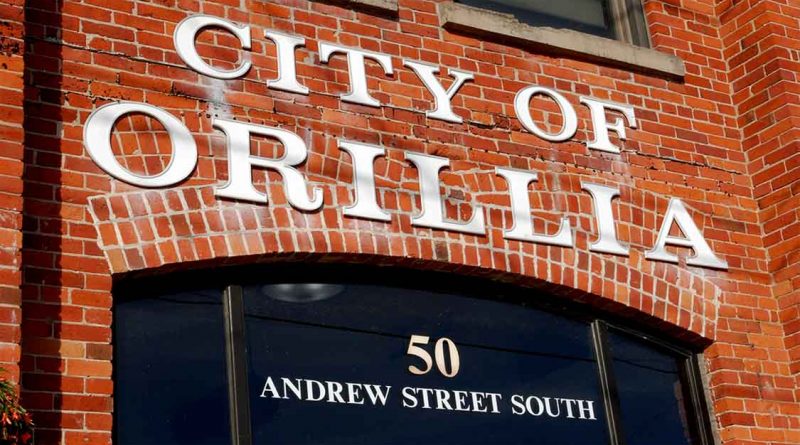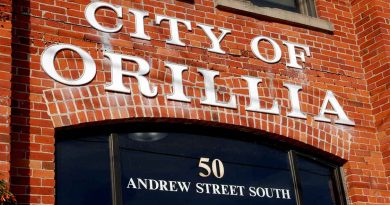Council Preview
By John Swartz
Monday’s Orillia council meeting starts early at 12:30 p.m. because of the annual general meeting of the Orillia Power Corporation. The OPC board will be present to explain the results of 2022.
What most people want to know is the OPC paid a $1 million dividend to the City in 2022. The recommended dividend for 2023 is $750,000 (loss of earnings in 2022 explained below)
Additionally the OPC paid $32,000 in property taxes and $26,000 to rent City owned rooftops for solar installations. The City also holds a $5 million note and the OPC paid $315,000 interest.
Revenue in 2022 was down by almost $1 million to $9,689,000. Operating expense were only $4.5 million, but with other expenses such as depreciation, total expenses were $6.5 million, which produced a profit of $2.7 million.
OPC also took write downs on the value of investment property, cost of interest earned and a change in derivative liability which reduced the profit to $1.2 million. This is down from $2.6 million in 2021.
The notes to the financial statement attributes the loss of earnings to a loss of production and revenue from its hydro operations because of lower water flows in 2022. Solar revenues were on par with the previous year.
The City’s equity stake in the OPC, which includes retained earnings, now stands at $19.8 million.
When the OPC meeting adjourns and regular business starts, the Mnjikaning Kendaaswin Elementary School Choir will on hand to sing the anthem and a song composed by Lorraine McRea – and Chippewas of Rama councillor Dillon Bickell will recite the land acknowledgement.
There are no other deputations or presentations, and depending on if and how many people participate in the public forum council will move right away to a closed session. The environment department will report on the findings and outcomes of a Facility Security Risk Assessment.
Further down the agenda is a report on this subject, the purpose of which is for council to receive the information and give staff direction to create an action plan and forward costs to the 2024 budget.
There are no specific details of risks and solutions, but reading between the lines indicates there will be changes that affect how the public uses municipal facilities.
“Instances and tracking have shown an increasing trend of interactions and concerns following COVID-19 related closures.”
It turns out while wearing masks kept more of us alive, the real danger was not shortness of breath, but decreased ability to think, comprehend and behave. The City hired a security consultant last year directly as a result of an increase of violent and obnoxious behaviour at the Orillia Public Library and at City Hall. It turns out those weren’t the only places things are getting out of hand (not specified, but indicated).
There will be more cameras. Let’s hope no councillor says it will prevent crime, if that were so Youtube would be out of business. Cameras are very effective at helping to identify the lawless, but it would be a first if someone could document a crime was prevented. The City as an employer has an obligation to provide a safe workplace and staff are understandably concerned about a higher degree of people acting irrationally. This means we’ll all face mind-numbing procedures and restrictions on account of a few people we don’t want to deal with otherwise.
Reports
Back in public the first item is a report by councillor Janet-Lynne Durnford regarding her attendance at an ending homelessness symposium in Toronto. A fresh turn of events, the symposium was in early May and the report from a councillor attendee is ready in one month.
Durnford’s notes from a session with panellists Terrilee Kelford, co-chair, National Alliance to End Rural and Remote Homelessness and Carolyn Stewart, ED Feed Ontario included information that one of the main indicators of homelessness is use of food banks – which are being used 30% more in 2023 than in 2022. Most food bank users surveyed said they had less than $100 left after paying for housing each month. The panellists say that increasing income for the lowest quintile would save $33 billion in healthcare, education and social services costs.
Another panel said, “homelessness is at emergency levels fuelled by emergency shelters being over capacity; growing encampments; discriminatory practices in rental housing; low social assistance rates; lack of affordable housing supply, and the pandemic.“
Another panel indicated a patchwork of solutions are driven by emotion and incomplete information. The squeaky wheel is getting attention instead of decisions being driven by data.
They also said agencies need to coordinate and focus – houses fix homelessness (which implies a hodge podge of programs, well intended aren’t needed houses).
Another panel focused on rental regulations. They advocated change is needed in landlord/tenant relationships. Of the many points made, one change needed is a right to return after redevelopment (i.e. renovictions, or fine fix it up, but I’m still living here). Another change needed is clarifying reasons for evictions, which presumably is meant to short circuit landlords evicting on false pretense (e.g. I need it for my mother, then putting the unit back on the market in order to charge higher rent because of a change in tenants).
In Tent City
There were many other panels Durnford attended and provided notes from, however one on encampments is illuminating. The key messages from Kelly-Anne Salerno, Assistant Director of Housing, Region of Waterloo and Dr. Emily Paradis, Senior Policy Advisor, Office of the Federal Housing Advocate, Canadian Human Rights Commission are senior levels of government need to make the right to housing a thing. They said, “Encampment(s) are signs of the failures of successive governments at multiple levels.”
Municipalities are between two rocks. They don’t have the means or jurisdiction to make policy – they didn’t create the problem, yet they have to find solutions when tents start popping up and pay for it.
Durnford’s report is loaded with bookmarked URLs to supporting information and in the experience of this writer’s encounter with activity reports from councillors attending such things, is maybe the best seen in a long while.
Another Conference Report
Councillors Durnford, Luke Leatherdale and Jeff Czetwerzuk were at the OSUM (Ontario Small Urban Municipalities) annual general meeting and conference in April and filed a report.
In notes from the Association of Municipalities of Ontario session, there is push back on what caused the housing crisis.
“There is an emerging political narrative that municipalities were to blame for limited supply of housing and skyrocketing prices; AMO is resisting that narrative,’ according to Brian Rosborough, executive director of the AMO, and, “Bill 23 had no consultation, based on false narrative that housing shortages are the fault of municipalities.”
He also stated Bill 23 is costing municipalities $1 billion, inferring that is money which could be used for affordable housing.
Of the several other sessions attended, some of the points jumping off the page are:
- The approach needs to change from focus on ending homelessness, rather than managing homelessness
- There was advocacy for automatic speed enforcement by radar.
- Several communities are regulating short term rentals (Airbnb); Collingwood has a $2,500 fine for unlicensed rentals combined with a prohibition of ever getting licensed if fined; Tiny Township has received over 100,000 emails on the subject and 63% of council meetings had it on their agenda; Prince Edward county fines range from $10K to $20k and fines related to rentals (noise?) are $1,000.
- Cyber crime is now targeting schools for fresh SINs; insurance is harder to get and more costly.
- “You can’t cut taxes without cutting services.”
- According to the International Energy Agency, municipalities are charging ahead transitioning to solar energy and renewable.
The next report is from councillors Leatherdale and Czetwerzuk. They have a resolution to support the Simcoe County Health Coalition in opposition to the privatization of healthcare.
The resolutions concludes Orillia; “supports the Northwestern Ontario Municipal Association recommendation that the Ontario government reconsider its support for the expansion of private for-profit hospitals and clinics and rescind Bill 60.”
Board And Staff Reports
The Orillia Food Committee (which was created in 2018 as a one-year pilot project) wants council to establish a committee of council comprising:
* One Council Representative
• One member from the Simcoe Muskoka District Health Unit
• One member from Georgian College
• One member from Lakehead University
• One member from The Sharing Place Food Centre
• One local area farm operator
• One youth member aged 18-25 who identifies as a local student
• Four eligible electors, including:
* One member who identifies as Indigenous
* One member who identifies as a senior
* One member with lived experience of food insecurity or a background
in sustainable and equitable food systems
* Four eligible electors, including:
o One member who identifies as Indigenous
o One member who identifies as a senior
o One member with lived experience of food insecurity or a background
in sustainable and equitable food systems
Snow Way
The results are in from last winter about the City’s snow policy. Last winter the City tried using salt only on roads instead of the salt/sand mixture of the past. The city actually uses magnesium chloride. The City also changed plow only and sander only trucks to combination units.
While we got more snow in November and December than usual, we had less than usual the rest of the time. We also got more rain throughout winter, which didn’t mean less salting.
The City saved $80,000 keeping roads safe. There was a 50% reduction in complaints of icy roads. Road paint lasts longer (which should result in less expense). Staff also spent less time cleaning out storm sewers.
They are recommending continuing to use salt on roads and make that standard operating procedure, and extending the salt only plan to sidewalks for a trial next winter.
Surf’s Up, Any Time Now
The City’s expensively designed ($75,000), and useless for most missions, website has long needed attention. Funding to do something about it was approved in 2020 and at the speed of light through a fibre connection an update report is before council now.
Typical of bureaucratic practice, the report has some terms that had to looked up to understand what it all means. For instance, instead of going to the City’s website to look something up, or fill out a form sometime in the future you will eventually go to OrilliaNow to do your business and it’s gloriously being called a portal.

Now there’s a term, portal, that hasn’t been seen since the dotcom bust. These things are so common now the term portal is rarely used because almost all websites qualify as portals. Technically a portal differs from a Plain Jane website in that one can do a number of things, use different apps, services and functions from other websites without leaving the website you are currently on. A portal is pretty much all the things you can currently do on the City’s website, but this new thing is being positioned as something different.
For example you are now reading this on a portal since there are things you can do here which draw on apps from other websites (like get a subscription by clicking on one of the yellow buttons at the end of this article) and never appear to leave SUNonline/Orillia). It’s not new, it’s just the way the web is now.
Fifty percent of the cost of making a new website is being paid from a $75,000 grant from the Ontario ministry of agriculture, food and rural affairs, rural economic development program. So the City is spending twice as much for a new website as they did for the current one, hopefully it will work.
Apparently it is so complex it won’t be launched as done deal, but instead it will be launched in stages and to keep the grant money something has to be online by December 31. The report states it is ready to launch now.
Staff say, “The portal will be updated as new opportunities or suggestions for enhancements arise,” which could mean as people call and say, “I want to do X, but can’t find it on your website.”
Council On The Move
In 2022 council approved a budget of $530,000 to renovate the council chamber. This year at budget they increased it to $570,000 because bids to do the work were higher.
After the June 19 meeting council will have to meet elsewhere while the work to improve accessibility and upgrade the audio/visual components is happening. Staff investigated moving to either the Orillia Recreation Centre, Rotary Place or the Opera House. The first two were ruled out, so off to the Opera House it is.
Summer meetings will happen online. Beginning in September council will meet at the Opera House in the Studio Theatre (December’s budget meetings will be in the Lightfoot Auditorium) until the end of the year. Any special meetings will be online.
The cost to hold meetings at the Opera House is $4,195, because, thanks to an accountant, the City has to pay itself rent. If all the meetings were held online (which is the second option), there would be no additional costs.
Nice Land You’ve Got There
The City is having an Open House June 20 regarding annexation details. The meeting was to be online only, but some councillors asked staff to have it be in person.
Staff report it will cost $15,000 more to have an in person meeting (and put the study project over budget) than it would to stay as an online meeting. Though allocation has not been finalized, it is likely to be at Rotary Place.
You kind fond more details about the annexation in SUNonline/Orillia’s story here. Staff are presenting three options for council; keep things as they are, move the meeting to in person, or do both an online and in person meeting.
Enquiry Motions
There are two on the agenda. The first is from councillor Czetwerzuk who wants staff to prepare a report about the feasibility of allowing mobile ice cream trucks to operate on streets in residential areas within the City of Orillia.
The second is from councillor Lauer who would like staff to report by January 31, 2024 on the efficacy and logistical challenges with Chapter 938 of the City of Orillia Municipal Code – Noise concerning the detonation of fireworks in residential areas.
It seems that the danger to people and residences from the flame part of fireworks ought to be included. One can find all kinds of video of people destroying their neighbourhoods for the sake of being annoying. With dry conditions we are experiencing now, the probability is higher.
In the consent agenda there is notice for the Simcoe Muskoka District Health Unit of their finalized budget. Council approved $489,420 in the 2023 budget. The SMDHU is advising the figure is $486,886, and for the first time in a few years council does not have to increase the budgeted amount.
Under by-laws, one is to approve the Official Plan and zoning amendments to allow the subdivision development in the West Ridge (1300 homes and commercial) under what is called the Trailside Neighbourhood Plan.
There are 4 letters objecting to the treatment of a wetland and storm water management affecting Bass Lake. One of the letter writers is a land use planner for a conservation authority in Kingston who happens to live next door to the development. The others are from people with vested interests in neighbouring properties and the watershed.
Another by-law removes the requirement for a Vulnerable Sector Check for those applying for a license to operate as ride sharing drivers. The VSC is too broad and the things people, and the City should be concerned about are already covered in a criminal record check.
The meeting is open to the public and can be watched live on the City’s Youtube channel.
(Photos by Swartz – SUNonline/Orillia; Images Supplied)




